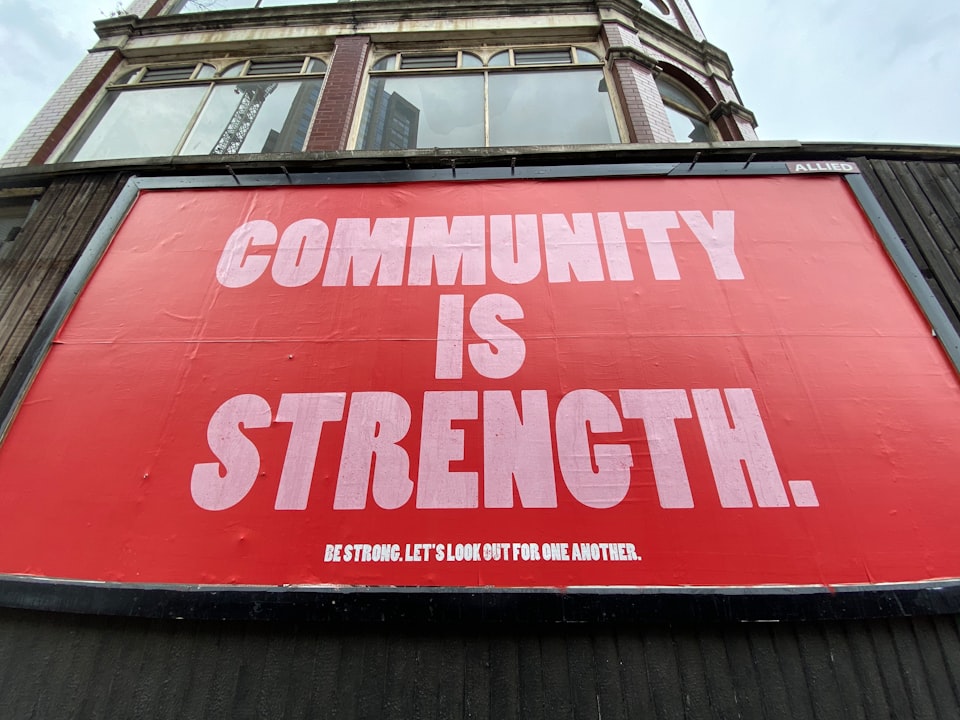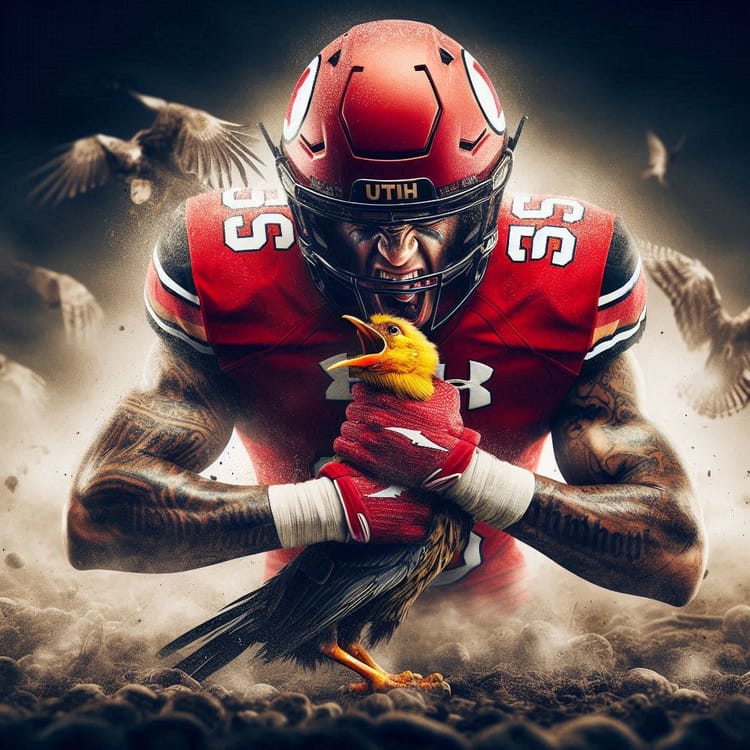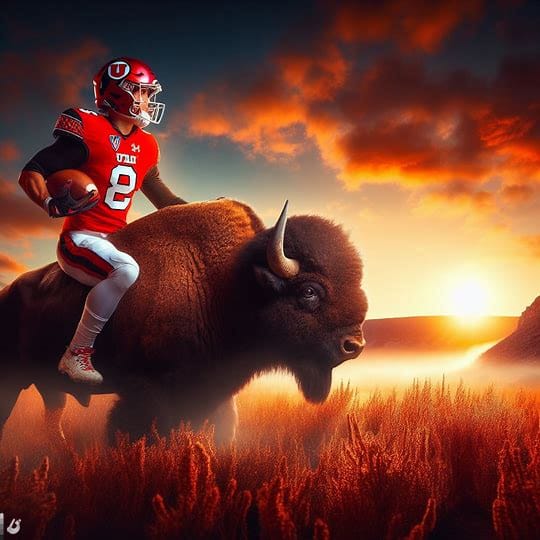Injuries Break Players, Not Communities

The worst part about Saturday’s potato salad of a football game happened off the field. The event itself – Brant Kuithe’s season ending ACL injury – happened on the field, with little to no contact, immediately making viewers assume the worst. As a viewer, that didn’t set in until quite a while later when Kuithe re-appeared on the sideline with his uniform off, his leg wrapped, and on crutches. Teammates came over to offer their support, and that’s when you saw the heartbreak and frustration of a person who gave everything and got dealt a losing hand in return.
It may seem selfish or naive to consider the emotions on the sideline the worst parts of the game rather than the devastating injury itself. I’ve never torn my ACL, or had any other significant bodily injuries to compare them to. I’ve never had to exit the proverbial field of play limping toward a medical tent, wondering what one moment, one plant of a foot, could mean for my professional career or my professional livelihood. I can’t begin to empathize with the physical pain Brant Kuithe was feeling on Saturday, but when he emerged from that tent and took his seat on the metal bleacher behind the team, where he sat mostly still as teammates gradually came over and offered their support, the feeling became much more familiar, not because we were suddenly able to relate to the injured football player on the screen, but because we could see what looked like the weight of every worry on that person’s face, as his season (and likely college career, as he is expected to rehab and prepare for the NFL draft) ended months early.
Watching Kuithe – and Chris Curry the week before last – experience a season ending injury in real time was devastating as a fan because of the lasting impact it will have on the football field. Both of those young men were having breakout seasons, only to have it stripped away from them and the Utah Football team in a moment. Watching Kuithe and Curry experience the anger, stress, and disappointment of their injuries in real time was something more meaningful and impactful, because the micro-lens through which we typically view this sport, which is focused intently on wins, losses, and championship appearances, was swiftly expanded to show us the emotional impact an injury has on the person.
Our goal with the Utah Blockcast is relatively simple: bring the community back into college football. In an increasingly digital world with fewer opportunities for human interaction every day, the idea of community is easy to lose or to distort. The Utah Football community is not a stadium or tailgate lot filled with fans on Saturdays. Communities are not made of fans and players and coaches and hotdog vendors and TV executives. Communities are made of people – of neighbors – who care for each other and who act in each others’ best interests and not only their own. If there’s one thing we’d like each and every Utah Blockcast listener, reader, or follower to take away, it’s that the person behind the keyboard, the Twitter avatar, or the uniform is a person who deserves respect, kindness, and empathy.
As fans, our sports relationship with players is rather transactional. In the moments after injuries, the conversation around the future of the player becomes less about the player, and more about the void to be filled.
How can Utah replace his productivity on the field? Can other players slide into his role? Which combination of players make up the complex algorithm that is now a missing player?
This is a conditioned response, as we’ve been told our whole lives things like “Next Man Up”, and “There’s No ‘I’ In ‘Team’” in order to collectivize us in pursuit of the ultimate goal: on-field success. Commentators and analysts exist to provide us details of the game, and more so in college football than any other, to put aside the individualism of players for the collectivism of The Team, The Game, or The Sport.
In this unique and ever-evolving recipe for college football community, I believe the players are the most important, as they are the thing that brings us together against all other odds, and they are responsible for the product we see on the field. Absolutely nothing happens without the players. Unwavering support for their team is what makes someone a fan, but unwavering support for players from recruitment, to depth chart, to on-field play is what makes somebody a fanatic, a true believer of the staff, process, and the ingredients needed to make the best roster stew possible. To turn a college football fanbase into a community, we need to go a step backward, see the larger picture, and stop thinking of these players as assets on a screen, whose inherent properties will make them more or less likely than their replacement asset to bring on-field success to The Team, and start thinking of them as people, whose well-being, success, and future success is as much our responsibility as theirs. It is becoming more and more difficult to separate the lives of college students – of people – from their roles as athletes on the field. What I’m proposing is to stop separating the two at all.
This morning I’m thinking of Brant Kuithe and Chris Curry, two young men we’ve seen give their bodies to The Team we all cheer for, but who have given us much more. They’ve given us joy, belonging, and commonality. As returning upperclassmen they’ve given us championship wins. As players, our gaze has shifted to the productivity of their replacements, but as people – people going through what is surely one of the most mentally and physically excruciating times of their lives so far – our support cannot waver. Brant Kuithe, Chris Curry, and all other injured athletes fall out of the spotlight of fans, but they should never fall out of the spotlight of their community.
This season, as you are lamenting the Utah Football players lost to injury and what could have been with them on the field, I urge you to also think of the lives upended by moments of injury, what that injury meant to these players, and the fact that that injury was in large part for your entertainment – a cost of the common goal of The Team reaching new heights.
The Utah Blockcast is decidedly on Team Kuithe and Team Curry. And Team Rising and Team Thomas. And Team Bernard and Team Phillips III. And Team Johnson and Team Reid and Team Vele and Team Enis and Team Whittingham and Team Hubert and Team Broughton and so on and so forth. We want Utah Football’s success, but not more than Utah Football players’ success, and certainly not at their expense.
Despite the internet jokes, I believe in Thoughts and Prayer. I also believe it is not enough. We’re offering up our thoughts and prayers for Brant Kuithe and Chris Curry as they rehab their injuries, because that’s the bare minimum that should be expected from a community. I’ll be thinking and praying for those two, but also continuing to support them.
Support comes in many forms and from many sources. These players will need it in any and all ways imaginable as they hit the road to recovery. As the season moves forward, continue to show support to these fine young men. The last thing we want to do in our community is to make them feel forgotten.
The Blockcast has some ideas of how to keep these guys “in the game” thanks to the new NIL world we now live in. However, we’d love to hear ideas from our community as well. Keep your eyes and ears peeled as we look for opportunities to support Brant Kuithe, Chris Curry, and the entire Utah Football community.
Have a unique idea for supporting Brant Kuithe, Chris Curry, and other injured athletes? Tweet us @BlockcastPod on Twitter.






Member discussion